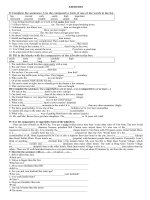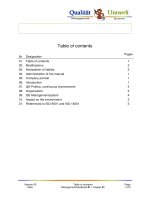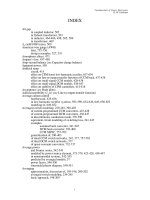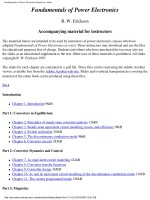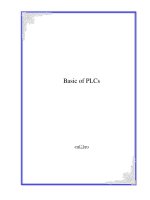Tài liệu Legacies of Power pdf
Bạn đang xem bản rút gọn của tài liệu. Xem và tải ngay bản đầy đủ của tài liệu tại đây (1.7 MB, 376 trang )
Free download from www.hsrcpress.ac.za
Free download from www.hsrcpress.ac.za
Leadership Change
and Former Presidents
in African Politics
Edited by
Roger Southall and
Henning Melber
Free download from www.hsrcpress.ac.za
Compiled by the Democracy and Governance Research Programme of the
Human Sciences Research Council
First published in South Africa by HSRC Press
Private Bag X9182, Cape Town, 8000, South Africa
www.hsrcpress.ac.za
Published in Europe and the United Kingdom by Nordiska Afrikainstitutet/
The Nordic Africa Institute
PO Box 1703, SE-75147 Uppsala, Sweden
© 2006 Human Sciences Research Council
First published 2006
All rights reserved. No part of this book may be reprinted or reproduced or utilised in
any form or by any electronic, mechanical, or other means, including photocopying
and recording, or in any information storage or retrieval system, without permission
in writing from the publishers.
Copy editing by Vaun Cornell
Typeset by Jenny Wheeldon
Cover design by Farm Design
Print management by comPress
Distributed in Africa by Blue Weaver
PO Box 30370, Tokai, Cape Town, 7966, South Africa
Tel: +27 (0) 21 701 4477
Fax: +27 (0) 21 701 7302
email:
www.oneworldbooks.com
Distributed in Europe and the United Kingdom by The Nordic Africa Institute
PO Box 1703, SE-751 47 Uppsala, Sweden
Tel: +46 18 56 22 00
Fax: +46 18 56 22 90
email:
www.nai.uu.se
Distributed in North America by Independent Publishers Group (IPG)
Order Department, 814 North Franklin Street, Chicago, IL 60610, USA
Call toll-free: (800) 888 4741
All other enquiries: +1 (312) 337 0747
Fax: +1 (312) 337 5985
email:
www.ipgbook.com
Worldwide, except Europe and the United Kingdom
ISBN 0-7969-2120-2
In Europe and the United Kingdom
ISBN 91-7106-558-X
Free download from www.hsrcpress.ac.za
Contents
List of tables vii
Acknowledgements ix
Abbreviations and acronyms xi
Introduction: about life after presidency xv
Henning Melber and Roger Southall
1 Former presidents in African politics 1
Roger Southall, Neo Simutanyi and John Daniel
2 Soldiering on: the post-presidential years of
Nelson Mandela 1999–2005 26
John Daniel
3 Unpacking the ‘model’: presidential succession in Botswana 51
Kenneth Good and Ian Taylor
4 The contested role of former presidents in Zambia 73
Neo Simutanyi
5 ‘Presidential indispensability’ in Namibia: moving out of office
but staying in power? 98
Henning Melber
6 ‘When I am a century old’: why Robert Mugabe won’t go 120
David Moore
7 Toxic mushrooms? The presidential third-term debate in Malawi 151
Seán Morrow
Free download from www.hsrcpress.ac.za
8 Politics and presidential term limits in Uganda 175
Roger Tangri
9 Immunity or accountability? Daniel Toroitich arap Moi:
Kenya’s first retired president 197
Thomas P Wolf
10 Troubled visionary: Nyerere as a former president 233
Roger Southall
11 Rawlings’ former presidency: a threat to democracy in Ghana? 256
Kwame Boafo-Arthur
12 An army of ex-presidents: transitions, the military and
democratic consolidation in Nigeria 281
Sola Akinrinade
13 Despot deposed: Charles Taylor and the challenge of
state reconstruction in Liberia 308
Daniel Hoffman
Appendix 332
Contributors 334
Index 338
Free download from www.hsrcpress.ac.za
vii
List of tables
Table 1.1 How leaders have left office in sub-Saharan Africa,
1960–2004 2
Table 2.1 Members of the Nelson Mandela Children’s Fund, 2004 34
Table 5.1 Parliamentary election results for the larger parties in
Namibian elections, 1989–2004 101
Table 12.1 Regime changes in Nigeria, 1960–99 284
Free download from www.hsrcpress.ac.za
Free download from www.hsrcpress.ac.za
ix
Acknowledgements
This volume is an outcome of collaborative efforts between the Democracy
and Governance Research Programme of the South African Human Sciences
Research Council (HSRC) and the Liberation and Democracy in Southern
Africa (LiDeSA) project of the Nordic Africa Institute based in Uppsala,
Sweden. It builds upon previous cooperation which resulted in a special
issue of the Journal of Contemporary Africa Studies (Volume 21, Number 2,
May 2003) which was co-published as a freestanding volume by HSRC Press
in 2003 as Limits to Liberation in Southern Africa: The unfinished business of
democratic consolidation, edited by Henning Melber.
Encouraged by this earlier experience, the two partner institutions agreed
to proceed further with work originally undertaken by the HSRC on behalf
of the Nelson Mandela Foundation (NMF) on a smaller scale concerning
the role of former presidents in Africa. Consequently, with the backing of
the NMF and the Swedish International Development Cooperation Agency
(Sida), the project on ‘Presidential Transitions and the Role of Ex-Presidents’
emerged during late 2003 as a comparative endeavour, finally resulting in the
exploration of a dozen different case studies in Anglophone African countries.
The scholars assigned discussed preliminary papers at an internal workshop
in Cape Town in December 2004. It was fully appropriate that we, as editors,
should meet to edit these revised drafts in Windhoek in late March 2005
during the time when the people of Namibia celebrated the 15th anniversary
of that country’s independence, and witnessed for the first time a transfer
of presidential power. The torrential rain which fell during the ceremony,
welcome in a country which too often experiences drought, did nothing to
dampen the spirits of those present as they gave a warm reception to their
new president.
At the same time, when in Windhoek for many a dream came true,
unfortunately other dreams found a painful end in confrontation with political
reality. Ken Good, one of the contributors to this volume, was at the time of the
celebrations in Namibia, served with a deportation order by the president in
neighbouring Botswana for being considered a threat to the country’s national
security interests. This was directly related to his involvement in the chapter
Free download from www.hsrcpress.ac.za
LEGACIES OF POWER
x
on Botswana presented in this volume. We regret to experience once again
that the pursuance of rigorous, committed, but at the same time intellectually
honest scholarly work is met with repression even in environments widely
regarded as being liberal democratic. We will remain loyal to advocating the
principles of uncompromising academic freedom and pursuing the advocacy
role of social sciences in contributing to notions of good governance. We trust
the contributions to this volume offer testimony to this.
We are hopeful that this volume will offer constructive insights and add
relevant aspects to the body of currently available knowledge. It aims at
scholars, policy-makers and a wider audience alike in the hope of promoting
best practices in a sensible policy area of direct relevance to the people in
African societies. We are grateful to the Open Society of South Africa for
further funding which will enable us to disseminate the findings of the study
throughout the southern African region.
We wish to acknowledge our debt to the NMF, the Open Society of South
Africa and Sida for their generous financial support, without which the
completion of this project would have been impossible. We would also like to
give particular thanks to John Samuel, Chief Executive Officer of the NMF,
for his quiet but constant support (in this, as for other projects conducted
at the HSRC). Joan Makalela, administrative assistant in the Democracy
and Governance Research Programme, worked indefatigably to ensure our
workshop was a success. John Daniel, wearing his HSRC publishing hat, dealt
with many aspects of project management, as well as making his own valuable
academic contribution, while other members of the HSRC Press were as
efficient as usual in dealing with the technical aspects of editing. Finally, we
would like to thank our contributors for taking part in a project which has
been as much fun as it has been so thoroughly fascinating.
Roger Southall and Henning Melber
Free download from www.hsrcpress.ac.za
xi
Abbreviations and acronyms
ACDR Association of the Committee for the Defence of the Revolution
AFORD Alliance for Democracy
AFRC Armed Forces Revolutionary Council
ALF Africa Leadership Forum
ANC African National Congress
ANPP All Nigeria Peoples’ Party
ASP Afro-Shirazi Party
ATU Anti-Terrorist Unit
AU African Union
BCP Botswana Congress Party
BDP Botswana Democratic Party
BNF Botswana National Front
CCAP Church of Central Africa Presbyterian
CCJP Catholic Commission on Justice and Peace
CCM Chama Cha Mapinduzi (Tanzania)
CDR Committees for the Defence of the Revolution
CRC Constitutional Review Commission
CUF Civic Unity Front
DP Democratic Party
DRC Democratic Republic of Congo
ECOMOG Economic Community of West African States Ceasefire
Monitoring Group
ECOWAS Economic Community of West African States
ESO External Security Organisation
FDC Forum for Democratic Change
FDD Forum for Democracy and Development
GCA Global Coalition for Africa
GDP gross domestic product
GNU Government of National Unity
HSRC Human Sciences Research Council
ICD Inter-Congolese Dialogue
IFP Inkatha Freedom Party
IMF International Monetary Fund
Free download from www.hsrcpress.ac.za
LEGACIES OF POWER
xii
JFM June Fourth Movement
KANU Kenya African National Union
KAP Kalangala Action Plan
LDP Liberal Democratic Party
LPAC Legal and Parliamentary Affairs Committee
LURD Liberians United for Reconciliation and Democracy
MBC Malawi Broadcasting Corporation
MCP Malawi Congress Party
MDC Movement for Democratic Change
MEC Malawi Electoral Commission
MMD Movement for Multiparty Democracy
MODEL Movement for Democracy in Liberia
MoU Memorandum of Understanding
MP Member of Parliament
MRF Mandela Rhodes Foundation
NAK National Alliance Party of Kenya
NARC National Alliance Rainbow Coalition
NCA National Constitutional Assembly
NCP National Convention Party
NDA National Democratic Alliance
NDC National Democratic Congress
NDP National Development Party
NEC National Executive Committee
Nepad New Partnership for Africa’s Development
NGO non-governmental organisation
NICE National Institute for Civic Education
NMCF Nelson Mandela Children’s Fund
NMF Nelson Mandela Foundation
NP National Party
NPFL National Patriotic Front of Liberia
NPP New Patriotic Party
NRA National Resistance Army
NRM National Resistance Movement
NRM(O) NRM Organisation
NTGL National Transitional Government of Liberia
OAU Organisation of African Unity
Free download from www.hsrcpress.ac.za
xiii
PAC Public Affairs Committee
PAFO Parliamentary Advocacy Forum
PDP People’s Democratic Party
PMC Parliamentary Movement Caucus
PNDC Provisional National Defence Council
PNP People’s National Party
PRA People’s Redemption Army
PRC People’s Redemption Council
RA Reform Agenda
RPDC Rules, Privileges and Discipline Committee
RUF Revolutionary United Front
SADC Southern African Development Community
SSS Special Security Service
Swapo South West African People’s Organisation
TAC Treatment Action Campaign
TRC Truth and Reconciliation Commission
TJC Truth and Justice Commission
UDF United Democratic Front
UJCC Uganda Joint Christian Council
UN United Nations
UNIP United National Independence Party
UPND United Party for National Development
Zanu-PF Zimbabwe African National Union-Patriotic Front
Zapu Zimbabwe African People’s Union
ZCTU Zimbabwe Congress of Trade Unions
ABBREVIATIONS AND ACRONYMS
Free download from www.hsrcpress.ac.za
Free download from www.hsrcpress.ac.za
INTRODUCTION
xv
Introduction: about life after presidency
Henning Melber and Roger Southall
This volume addresses what has become an increasingly common phenomenon
in Africa over the last two decades – the presence within the countries they
once ruled of former heads of state and presidents. Prior to this, if they were
not forcibly ejected from power, it was customary for national leaders to
remain in office, often citing their indispensability, cultivating an iconic status
and even implying that age could not wither them. As late as at the end of
the twentieth century, such notions remained central to ‘neo-patrimonialism’,
a system in which ‘disorder’ was identified by a widely and controversially
discussed book by Chabal and Daloz as a ‘political instrument’, a set of vertical
and personalised relations whereby rule was maintained:
…the ultimate ambition of those who have power is most often
to establish their standing as Big Men. Such standing is, by its very
nature, subjective and can only be achieved within a context of
personalized relations where clients, or dependants, will ensure its
recognition. It is not, therefore, sufficient to be acknowledged as
the supreme political ruler. It is also necessary to be recognized as
the primus inter pares among all Big Men. (1999: 158)
Chabal and Daloz do, however, admit that this generalisation does not account
for those exceptional African heads of state who ‘may genuinely aim to
transcend the short-term view in favour of longer-term developmental goals’.
Nonetheless, they insist ‘that the ability of such exceptional leaders to move
the political system beyond its present rationality is limited, not primarily
because of a lack of ambition but much more fundamentally because of the
nature of existing forms of political legitimacy’ (Chabal & Daloz 1999: 162).
The contributions to this book, while making no further explicit reference
to this far-reaching (and much disputed) assumption, will certainly offer
empirical studies which will contribute much to this wider debate.
Free download from www.hsrcpress.ac.za
It was a dominant perception until the early 1990s that African rulers do not vacate
their office alive. The 1990 presidential address to the African Studies Association
of the United Kingdom presented some striking arithmetic to illustrate the point.
By then, as Anthony Kirk-Greene (1991: 181) summarised, the mean duration in
power of leadership in 17 African states (a third of the continent) was 25 years.
The ‘for life’ image associated with African rulers contrasted, however, with the
brevity of rule of others, with no fewer than 20 having been in office for less
than a year. At the end of 1988, the continental average duration of office for
the 158 African leaders who had been or were heads of government in 50 states
since 1960 was calculated at 3.1 years (Kirk-Greene 1991: 181). Nonetheless,
the general assumption was that the shorter periods in office were attributed
almost exclusively to the incumbents’ untimely departure from this world: ‘If my
question of “What Happened to the President Afterwards?” has been overlooked
in the literature, this may largely be due to the indisputable fact that, unless one
is talking of a meta-physical after-life, in nine cases out of ten it is a rhetorical
question: there was no Afterwards’ (Kirk-Greene 1991: 183).
However, this notion was soon to be challenged by James Polhemus, who
pointed out that Kirk-Greene’s question required major rephrasing, since
the (former) heads of state were not as passive as his formulation implied.
Indeed, far from being in a minority, extant heads of state or government in
the 16 Commonwealth countries in Africa who had left or lost office between
independence and August 1992 were in a large majority: of the 52 who had
held office during that period, 16 were still in office, and of the 36 no longer in
power, four had died in office of natural causes, and fully 29 had experienced
‘a non-metaphysical “Afterwards”’. In short, rather than being merely ‘passive
players’, many former heads of state and government were very much alive,
and the more apposite question to be addressed was ‘What did the President
do Afterwards?’ – even if the brutal realities of African politics also meant
that the further question of what had ‘happened’ to him remained valid (for
many such former leaders were to be harassed or imprisoned) (Polhemus
1992: 2f). Nonetheless, for all that many former leaders were provided with
limited options, quite a number of them did face ‘the questions of what to do
with what remained of a life which had to that point been characterized by
power, purpose, and not to put too fine a point on it, position and privilege’
(Polhemus 1992: 7), even though the varied solutions to this problem which
they found were by no means always well received by successor regimes.
LEGACIES OF POWER
xvi
Free download from www.hsrcpress.ac.za
The dilemmas that such former heads of state faced and posed were to
become far more pressing as a result of the ‘second wind of change’ which
swept Africa from the late 1980s as an outcome of both domestic discontents
and external pressures invigorated by the end of the cold war. There were few
incumbent leaders who were not reluctant to vacate office, and there were
many transitions from authoritarianism to a more democratic order which
were deliberately stalled or rendered difficult, and not all were successfully
accomplished. Nonetheless, the forces for change were such that there were
few countries where they could be denied, and there were few leaders who
could ultimately resist the call for democratic elections. Some successfully
rode the tiger and managed to stay in power by manipulating new rules of the
game, which now usually included the imposition of limits on the length of
time a president could stay in power. Yet others were compelled to bow out,
some far less gracefully than others. But the outcome was that an increasing
number of rulers were displaced, and new regimes and former presidents were
compelled to seek some answer to the question of what the role and status of
former heads of state should be. Our purpose in this book is both to examine
the dilemmas which demands for presidential transitions impose upon
incumbent rulers and to analyse the relationships which are evolving between
new regimes and their predecessors. Unfortunately, issues of practicability
have dictated that we had to restrict our case studies to Anglophone sub-
Saharan Africa, yet we hope that it will manage to provoke examination of
what we are convinced is emerging as an extremely important issue in other
parts of the continent.
1
Our perspective is framed by probing three propositions, which are put
forward in the overview provided by Roger Southall, Neo Simutanyi and John
Daniel in Chapter 1. The first is that while the hybridal (neither ambiguously
presidential nor parliamentary) political systems which exist in much of post-
independence Africa incline new leaders to assume that their predecessors
should follow the example of former US presidents in withdrawing from day-
to-day politics, former presidents themselves may choose to emulate those
leaders in parliamentary systems who seek to regain power. The second is that
the role allotted to or pursued by former African presidents reflects not only
the nature of their regimes, but also the manner of their leaving office. The
third is that while the prescription of the roles and rights of former presidents
is always an important aspect of any country emerging from a ‘difficult
INTRODUCTION: ABOUT LIFE AFTER PRESIDENCY
xvii
Free download from www.hsrcpress.ac.za
transition’ from authoritarianism to democracy, there is simultaneously a
need to balance the demands for transitional justice (the desirable objective
that former leaders should remain legally and politically accountable for any
past misdeeds of office) against the requirements of political stability.
While our case studies indicate some general trends, they also demonstrate
an enormous variety in the way that new leaderships are responding to these
dilemmas, and in how authoritarian regimes are wrestling with issues posed
by democratisation, notably whether presidents’ tenure of office should be
bound by fixed term limits. On the whole, our conclusions are that, first,
the continuing engagement of former presidents in day-to-day politics, even
if constitutional, tends to provoke conflict with new regimes and may well
provoke an autocratic response which may test the limits of tolerance in a new
democracy. Second, the better their record in office, the more likely presidents
are to facilitate a relatively easy transition from one government to another and
to play a constructive post-presidential role domestically and internationally.
Finally, it is almost inevitable that any difficult transition, involving the
potential or actual standing down of an authoritarian and corrupt dictator,
will involve construction of some form of what Jennifer Widner (1994) refers
to as a ‘reform bargain’. Or to put this in a more popular parlance, the crafting
of stable democracies will usually require that democrats have to hold their
noses and make important concessions protective of incumbent power-holders
if they wish to fashion a political transition and subsequently consolidate
democracy. However, what our individual case studies do not demonstrate
(but which is a point that we need to emphasise here) is that what happens
in one country may strongly influence what happens in another. On the
one hand, popular pressures to overthrow tyrants or to impose presidential
term limits can often be encouraged by democratic triumphs elsewhere. On
the other hand, a Robert Mugabe may be severely discouraged from leaving
office by events in other African countries where former presidents have been
variously dishonoured, persecuted and prosecuted for former misdeeds. A
strong message emanating from our studies is that how the generic dilemmas
concerning presidential transitions and former presidents are addressed
inevitably reflects the peculiar political cultures and dynamics which obtain
in individual countries.
It was tempting to arrange our case studies in some sort of progression of
virtue. Indeed, our starting with a case study on the iconic Nelson Mandela as
LEGACIES OF POWER
xviii
Free download from www.hsrcpress.ac.za
a former president, and our concluding with one on the removal and exile of
Liberia’s brutal and despotic Charles Taylor, may encourage readers to think
that we have done precisely that. However, it very easily became clear that
no such ranking was tenable, especially on the basis of the rich and nuanced
analyses offered by our contributors wherein the motivations and actions
of presidents in conceding power are so often contradicted by the actual
outcome. For instance, we most certainly acknowledge that Nyerere’s record as
a former president ranks equal or close to that of Mandela; yet equally, we also
have to recognise that the Tanzania in which he stood down from power in
1985 was very different from the South Africa of 1999, the year when Mandela
departed office. Similarly, for all that Nyerere’s role as a former president was
clearly commendable, in retrospect its legacy is complicated by his having
established the precedent whereby, even if as a transitional device, an outgoing
president retains the presidency of the ruling party. As it happened, Nyerere
used his continuing control of the party to good effect. He utilised his position
to further democracy and provoke debate about governmental policy, yet
he never sought to use it to further his own personal domination and he
resisted the temptation to sabotage the rule of Ali Hassan Mwinyi, who had
followed him into State House. In contrast, as the chapter on contemporary
Malawi demonstrates, retention of the ruling party presidency by an outgoing
president can be a cause of political instability if it is utilised to undermine
and limit the authority of the successor. Similarly, the Namibian case cannot
exclude the possibility that Sam Nujoma’s staying on as president of the ruling
party – whilst having stood aside as Namibian head of state for his handpicked
successor Hifekepunye Pohamba – indicates a desire to continue governing by
remote control.
We have ultimately chosen to proceed through our chapters in a rather
meandering, geographical fashion, choosing arbitrarily to start with South
Africa and thereafter wandering, with perpetual fascination, through other
countries of southern Africa, then East Africa, then West Africa. At risk of
repeating ourselves, let us stress again the variety of experience that is to be
found within the pages of this collection! We have no wish to spoil readers’
fun or make life unduly easy for future reviewers by summarising the content
of the chapters that follow. Nonetheless, having indicated above that there
are some generalities which appear to govern the role of former presidents,
and then having emphasised national differences, let us compromise
xix
INTRODUCTION: ABOUT LIFE AFTER PRESIDENCY
Free download from www.hsrcpress.ac.za
by highlighting what we, as editors, interpret as the major thrust of each
case study.
• John Daniel emphasises the enormously constructive (but not always
uncontroversial) role that has been played by Nelson Mandela in the
domestic arena around such key issues as HIV/AIDS, although he regards
his well-intentioned and much-lauded efforts with regard to conflict reso-
lution internationally as having been rather less successful than is com-
monly supposed.
• Kenneth Good and Ian Taylor recognise the important contribution made
by former President Ketumile Masire to African peace-making efforts in
Central Africa, yet argue forcefully that – contrary to Botswana’s image as
a model African democracy – the two presidential transitions experienced
in that country hitherto have served to consolidate elite power.
• Neo Simutanyi illustrates how newly incumbent presidents in Zambia have
used state powers to contain continued political activity by former presi-
dents, not least through the tendentious lifting of the bargained amnesty
from prosecution secured for himself by Frederick Chiluba before he
handed over to Levy Mwanawasa.
• Henning Melber shows how authoritarian tendencies within the liberation
struggle for Namibia’s late independence enabled Sam Nujoma to secure a
constitutional amendment allowing him to serve a third term as president,
and also encouraged him to stay on as leader of the ruling party after even-
tually pushing through a personally selected successor.
• David Moore argues that Robert Mugabe’s determination to hang on to
power in Zimbabwe is structured by a series of considerations, not least of
which is the fact that the neo-patrimonial system which his ruling party
has constructed has rendered him truly indispensable if the material and
political interests of those around him are to be maintained. They prefer
to postpone the inevitable, as Zimbabwe’s stalled transition leads it ineluc-
tably towards the dangers and tragedy of a failed state.
• Seán Morrow demonstrates how, although a bid for a third term in office
by Bakili Muluzi was defeated by democratic forces in Malawi, his deter-
mination to retain power indirectly after reluctantly standing aside for his
successor has set off a train of (as yet unfinished) events which have been
acutely politically destabilising.
• Roger Tangri proposes that Yoweri Museveni’s political dominance in
Uganda is such that he appears likely to defeat opposition to an extension
LEGACIES OF POWER
xx
Free download from www.hsrcpress.ac.za
INTRODUCTION: ABOUT LIFE AFTER PRESIDENCY
xxi
of his long run in office, and observes how international donors appear
resigned to their continued propping up of an increasingly authoritarian
regime because they deem it as having overseen an economic success.
• Thomas Wolf indicates how demands for one or another variety of ‘trans-
itional justice’ that accompanied the united opposition’s victory in the
2002 Kenyan elections, were eventually submerged by a combination of
bonds uniting the country’s political elite and the shorter-term needs of
political survival, leaving retired President Moi with both an enhanced
public stature and far more active political involvement than could have
been foreseen prior to the transition.
• Roger Southall outlines how Nyerere used his status as an honoured for-
mer president to push for democratic reforms at home in Tanzania while
engaging in peace-making in Africa and campaigning for a better deal for
poorer countries globally.
• Kwame Boafo-Arthur argues that the unwise and unconstrained political
antics of Jerry Rawlings since he has stepped down from the presidency
may constitute a threat to democracy in Ghana, and that the new govern-
ment of Arthur Kufuor may be justified in taking action against him so
long as it recognises due process.
• Sola Akinrinade deals with the unique case of Nigeria, where the succes-
sion of coups, counter-coups and uncertain democracies has resulted in a
multiplicity of former heads of state, and argues that the institutionalisa-
tion of their role constitutes a major aspect of democratic consolidation, a
process which continues to be undermined by the continuing domination
of political life by the military.
• Daniel Hoffman, while recognising the political difficulties surrounding
the prosecution of Charles Taylor for appalling human rights offences in
Liberia and Sierra Leone, argues that his poorly regulated exile in Nigeria
facilitates his continued political influence at home and threatens to allow
him to make a disruptive and dangerous comeback.
The Organisation of African Unity (OAU) was often referred to by
commentators as little more than a self-serving club for African presidents,
whose existence was premised upon the mutual convenience of the doctrine
of non-interference in the affairs of sovereign states, which provided cover for
authoritarian and despotic regimes throughout the continent. In contrast, it is
widely hoped that the launch of the African Union (AU) in 2002/2003 – and
Free download from www.hsrcpress.ac.za
LEGACIES OF POWER
xxii
the subsequent institutionalisation of a visible political will to exercise more
collective responsibility over the policies of member states – is an indication
that the present generation of African leaders will be more prepared to police
regimes which offend against international norms, rights and laws and to be
more responsive to pressures for democracy and ‘good governance’ at home.
The recent shift in trends – if not even paradigms – in presidential transitions
on the continent is highlighted by the increasing number of those who more
or less voluntarily hand over presidential powers while still being in good
physical shape and mental health. The birth of an African Statesmen Initiative,
launched in Mali’s capital Bamako in the presence of 15 former African heads
of state in June 2005, is no coincidence but the almost logical result. With
the support of several international institutions,
2
the elder statesmen (indeed
still all men) agreed on a remarkable document with far-reaching statements
in terms of their political ideals. The ‘Bamako Declaration of the African
Statesmen Initiative’, adopted on 8 June 2005, stated among other things:
We believe that democracy is the sole form of government that
permits the development of the range of national institutions
needed to ensure sustainable peace, security, economic growth
and social well-being. We applaud the spread of democratic
values and respect for the rights of citizens in a growing number
of African countries. We commit ourselves to continuing to use
our good offices to foster dialogue and the peaceful resolution
of the continent’s conflicts, and to promote human security
and democratic models of government that offer citizens the
opportunity to choose their leaders freely and participate fully
in the political life of their countries…We welcome the future
participation of outgoing heads of state and government in efforts
to promote democratic principles, good governance, and human
security and development through individual and collective
action…We affirm that changes of power and political succession
should always be based on constitutional rule and democratic
principles…We affirm the special responsibility of former heads of
state and government to support the development of strong, well
functioning legislative and judicial bodies, as well as other public
institutions to ensure public accountability.
3
Free download from www.hsrcpress.ac.za
xxiii
Certainly, there are some encouraging signs one cannot ignore when
dealing with the issue at present. The earlier stereotypes have lost even more
meaning and are increasingly less helpful in explaining the more complex
socio-political realities. Apart from the African presidential efforts which (if
belatedly) saw to the eventual displacement of Charles Taylor, Nigeria and
allied West African states have earned widespread plaudits for stepping in
to challenge the constitutionally manipulated succession to the presidency
of Faure Gnassingbe following the death of his father Gnassingbe Eyadema
(who had ruled Togo with an iron fist for 38 years since he overthrew the
government of Sylvanus Olympio in a military coup).
4
With the just adopted
‘Bamako Declaration’, the question posed previously during the early 1990s
remains more valid than ever: whether an increasing number of ‘African
heads of state will follow the eminent person path upon their retirement
from political office, rising above narrow national politics’. For some, most
certainly, this ‘would seem to be an attractive way of putting their talents to
good use and minimizing the pangs of withdrawal from a life of prominence
and importance’ (Polhemus 1992: 19).
‘Is there life after presidency?’ asked BBC Africa Live on the occasion of
the African Statesmen Initiative, inviting its audience to participate in the
debate. We cannot resist reproducing a few of the many different listeners’
contributions to illustrate the current opinions:
5
• ‘Presidents are people too. The life after presidency should be retirement.’
(Ghana)
• ‘Former presidents should be respected because of what they did for a
country. However at the same time, when Mugabe becomes a former presi-
dent, my views will change.’ (Zimbabwe)
• ‘There is always life and prosperity for presidents in Africa because most
of them are thieves.’ (UK)
• ‘Oh yes, there is life after the presidency. In fact a far better life…com-
pared to the presidency. For example, you get to sleep peacefully at night
(don’t have to worry about whether your army is plotting to oust you the
next morning); you become a well-respected statesman (provided you
left office voluntarily…poor Charles Taylor), and the lot. Life after the
presidency in Africa is like life after death – although no one has ever died
(please, don’t count Jesus) and come back to give account of what it is like
at the other end. However, the good news is that Africa is on the right path.
INTRODUCTION: ABOUT LIFE AFTER PRESIDENCY
Free download from www.hsrcpress.ac.za
LEGACIES OF POWER
xxiv
At least we are beginning to count Africa’s former presidents who left office
constitutionally. And it should send a very strong, positive message to sit-
ting presidents that…yes, there is in fact very good life after the presidency,
given you kept your promises to the best of your ability.’ (Liberia)
Notwithstanding the light at the end of the tunnel, progress is uneven.
The democratically interventionist posture of Nigeria and its allies in Togo
has scarcely been matched by the determination of neighbouring states
in southern Africa to continue to prop up the Mugabe dictatorship in
Zimbabwe, not least through Orwellian statements which devalue democratic
standards by upholding as ‘free and fair’ successive elections which have been
systematically structured to maintain the regime in power and undercut
the opposition. Even closer to home, one of our own authors, Ken Good,
Professor of Political Studies at the University of Botswana, when seeking
to present an earlier draft of his jointly authored paper for this book to a
departmental seminar at the University of Botswana in Gaborone, was served
with an arbitrary notice from the authorities declaring him a prohibited
immigrant on the grounds of his being considered a risk to national security.
This application of the full force of unrestricted autocratic repressive power
at the discretion of the President’s Office clearly indicates that our topic is a
highly sensitive one and that consideration of the role and status of current,
former and future presidents does constitute an important, and hitherto
largely unexplored, dimension of democratic consolidation (or lack thereof).
6
Nonetheless, despite the uncertainty of this advance, the important message
of this volume is (as Southall, Simutanyi and Daniel argue in Chapter 1)
that significant progress is being made on the African continent towards
the ‘ordinariness of presidential retirements’. In the final analysis, this is an
outcome of the democratic struggles of African people, who, in country after
country, have demonstrated their determination to confront dictatorships.
These struggles remain incomplete, but it is our hope that they can be
informed and strengthened by critical and committed scholarship of a nature
we trust this volume to be.
We offer our efforts presented here as a stimulus to further careful observation
and analyses concerning progress in a sensitive and still-contested arena
of institutionalised political power. During our final preparations of the
manuscripts for going to press, on 13 June 2005, five African presidents paid
a visit to their fellow Head of State George W Bush in Washington, DC.
Free download from www.hsrcpress.ac.za
xxv
According to the official announcement, the US president welcomed
Festus Mogae of Botswana, John Kufuor of Ghana, Armando Guebuza of
Mozambique, Hifikepunye Pohamba of Namibia and Mamadou Tandja of
Niger in the White House to ‘highlight the value that the United States places
on supporting democracy across Africa. President Bush recognizes these
countries’ successes at holding free and fair elections last year.’
7
Coming from
a president who was elected to office by a narrow victory whose outcome was
determined by hugely controversial (some say ‘rigged’) results in the states
of Florida and Ohio, such sentiments should not be regarded uncritically.
Indeed, this volume should not be taken as arguing that African presidents are
fundamentally different in their ambitions from their counterparts elsewhere;
just that they are considerably less constrained by constitutions and political
practice. Yet it is affirming, along with increasing numbers of political activists
throughout the African continent, that democracy demands that there should
be a regular and structured circulation not only of elites but of heads of state
and government too.
Notes
1 A recent study of a topic, which overlaps strongly with our own, covers the four
Francophone African states of Côte d’Ivoire, Mauritania, Benin and Togo, as well as
The Gambia (see N’Diaye, Saine & Houngniko 2005).
2 These include the US-American National Democratic Institute, the National
Endowment for Democracy, the Club de Madrid, the Bill and Melinda Gates
Foundation, the United Nations Development Programme, the German government,
the Dutch Institute for Multiparty Democracy, the African Centre for Strategic
Studies, the Open Society Institute of West Africa, the Westminster Foundation for
Democracy and USAID.
3 Quoted from the document as posted to the web by the National Democratic
Institute for International Affairs (Washington, DC) on 9 June 2005. The signatories
were the following former heads of state and government: Nicéphore Soglo (Benin),
Ketumile Masire (Botswana), Antonio Mascarenhas Monteiro (Cape Verde), Dawda
Kairaba Jawara (The Gambia), Jerry Rawlings (Ghana), Amos Sawyer (Liberia),
Albert Zafy (Madagascar), Joachim Chissano (Mozambique), Sam Nujoma
(Namibia), Mahamane Ousmane (Niger), Yakubu Gowon (Nigeria), Manuel Pinta
da Costa (São Tomé and Principe), Miguel Trovoada (São Tomé and Principe), Al
Sadig Al-Mahdi (Sudan) and Ali Hassan Mwinyi (Tanzania).
INTRODUCTION: ABOUT LIFE AFTER PRESIDENCY
Free download from www.hsrcpress.ac.za


